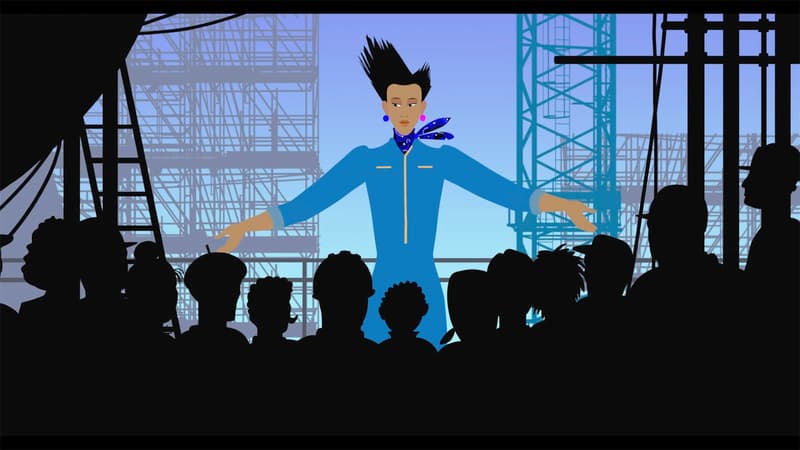The tireless Michel Ocelot. At 78, the director of Kirikou and the witch, Princes and princesses Y Azure and Asmar He just released his ninth film on October 19 in theaters. Available just for the holidays of All Saints, The pharaoh, the savage and the princess brings together three tales inspired by French, Middle Eastern and African folklore.
These three little moral fables, stories of emancipation and love, which draw on the classic schemes of the tale, successively explore the Egypt of the black pharaohs, the Auvergne of the Middle Ages and Turkey as imagined by the 18th century Westerner. .
In the first tale, a young king of Sudan goes to war and becomes pharaoh to win the heart of a queen’s daughter. In the second, which takes place in Auvergne, it is about a lord’s son, a prisoner and the mysterious “beautiful savage”, who comes to the aid of the weakest. The third tale takes place in Istanbul and recounts the encounter between a donut seller and a lonely princess.
Three short films imagined above all “for the pleasure” of the public: “I seek pleasure confronting other civilizations, other countries”, specifies the director, who prefers short stories to feature films. : “It’s very nice to make stories that are the right length, not stretching them or cutting their legs to make them fit.”
“I want us to be free from tyrants”
With its shadow theater, bright colors and brave young warriors, The pharaoh, the savage and the princess it will not disorient the viewer accustomed to the universe of Michel Ocelot. But with this film he intends to take the pulse of French society. The first scene of the film thus takes place in a construction site, a symbol of a society that must be rebuilt after the pandemic.
“This is the first drawing I did the first week of confinement,” explains Michel Ocelot. “I was terrified by what was happening, by this kind of end of the world. The country was coming to a complete standstill and I was wondering how long it would last. I also told myself that when we were going to wake up, there would only be ruins, which would have to be rebuilt.”
This is the ambition shown by The pharaoh, the savage and the princess: re-enchanting a world that is sorely devoid of poetry. “Among other things”, she moderates. “All media is good. You, journalists and I have powers. We talk to people. And we influence them. I try with my films to bring relaxation to people.”
In line with Dili to Paristhat won a César for Michel Ocelot, The pharaoh, the savage and the princess it is sometimes a bit darker than his previous films. The Auvergne tale thus offers an almost anarchist dimension, staging the destruction of a courthouse. An unexpected touch in his work: “I want us to free ourselves from tyrants,” the director insists.
“No Kirikou Without Me”
Michel Ocelot himself seeks to free himself, at his own level, from the “tyrants” of cinema: “I freed myself from the producers. I do what I want,” he smiles mischievously. Despite the success of his previous films, he received no support for this new project. “I have not received money from almost anyone. It is a universal denial.”
He is not willing to stop working. “I have two projects, one of which is very ambitious: telling Europe through fairy tales, because I don’t want Europe to fall apart. It is a great series for television where each country would bring their stories. had in mind for a long time.” This will be his testament: “It’s made for after me. It’s a gift I want to give people.”
Michel Ocelot has no plans to make one last movie with his favorite character, Kirikou. “For me, it’s over. My producer would like us to continue, but I feel like I said everything I wanted to say. The first movie is the actual movie. The others, they’re postscripts, but they’re also interesting, even though I didn’t want to do them.”
Michel Ocelot is also opposed to others taking over his character to make him live other adventures: “I think I’m going to give instructions so that we leave Kirikou alone. Kirikou, it’s me. It’s my guts. It’s my thoughts. It’s Y no one but me can make me speak! So there is no Kirikou without me.”
Source: BFM TV


